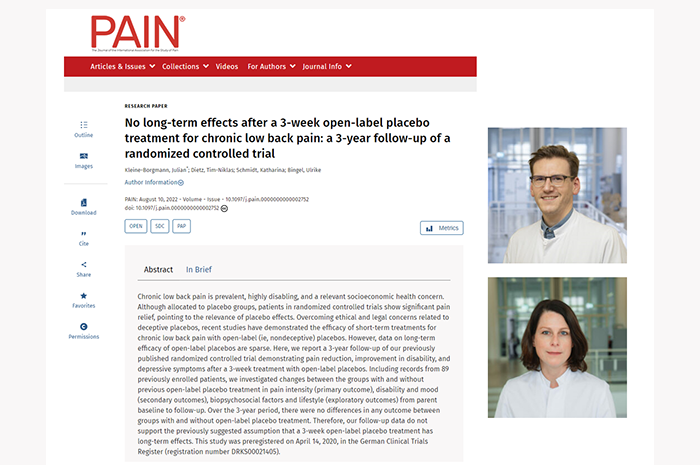How long does the positive effect of a three-week treatment with open-label placebos (OLP) last in chronic back pain?
This research question was posed by the team led by Dr. Julian Kleine Borgmann and Prof. Ulrike Bingel from the Center for Translational Neuro- and Behavioral Sciences at the University Hospital Essen, where they started a three-year follow-up study. The results have now been published as a research paper in the journal PAIN and can be read here. After three years, the effect was no longer detectable in terms of pain intensity, movement restrictions and mood.
Chronic low back pain is estimated to affect more than 10% of people during their lifetime. When so many suffer from back pain for more than three months, it has major social and economic implications. In 2019, Prof. Ulrike Bingel's research group at the University Hospital Essen was able to show that patients benefit when they also receive a placebo in addition to their usual pain therapy (read the study here). What was special was that all 122 participants in the study at Essen University Hospital knew about the nature of the drug-free capsule and deliberately took two placebos daily for three weeks. This open-label placebo study confirmed the hypothesis that OLPs can improve its therapeutic effect in addition to the usual treatment. Both pain intensity and functional impairment were decreased in the OLP group compared to the control group, and mood was improved at the end of the study. The follow-up study was now designed to test whether the effect was still detectable after three years. After 89 participants from the first study were interviewed, the scientists could no longer find a difference between the treatment groups.
Previously, a study by researchers at the University of Lisbon and Harvard Medical School, who surveyed patients 5 years after OLP treatment, had suggested possible long-term effects of OLPs for back pain. "Our study cannot confirm these findings," says Julian Kleine Borgmann, MD. "This may be because our study uses a different design that allows a better comparison, of the group treated with OLP with a control group.
"I am not surprised by the result. Rather, it is absolutely understandable to me that a 3-week therapy no longer has a relevant effect after 3 years. After all, that does not diminish the therapeutic benefit during the use of OLPs. Now we have to find out how we can make these effects usable for patients in the longer term". This is the question that numerous scientists around Prof. Ulrike Bingel are addressing as part of the Collaborative Research Center 289 "Treatment Expectation" of the German Research Foundation (DFG): "We need a better understanding of the mechanism of the OLP effect before we can work on long-term effects," explains Prof. Ulrike Bingel, Professor of Clinical Neurosciences at the University Medical Center Essen and spokesperson of the Collaborative Research Center. In this consortium, an interdisciplinary research team is investigating in 16 subprojects how expectations influence the success of treatment and how this effect can be used therapeutically in various diseases.

